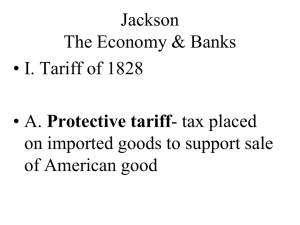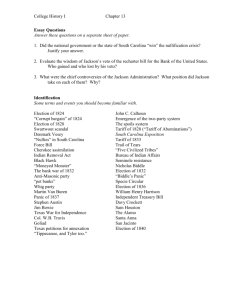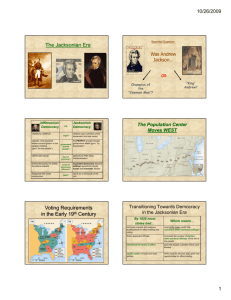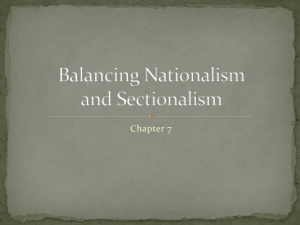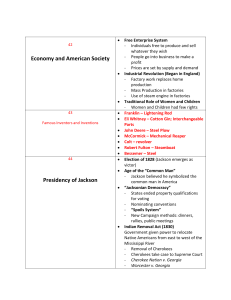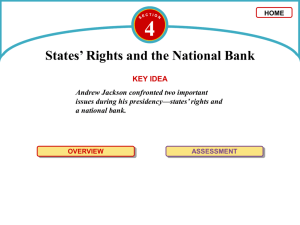The Age of Jackson, 1828-1840
advertisement
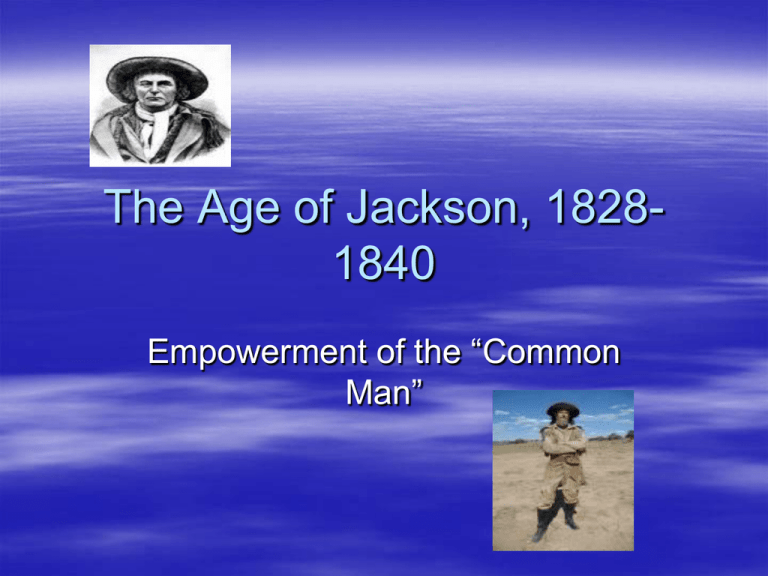
The Age of Jackson, 18281840 Empowerment of the “Common Man” The “New Democracy” Comparison to Jeffersonian Democracy – “government for the people” vs. “government done by the people” – Universal Manhood Suffrage! No property qualifications – New Western States Eastern States reduce voter requirements *Frederick Jackson Turner* “The Significance of the Frontier in American History” Cheap, available land has developed the “American character”. – Critics look for more complex thesis – Impact on Americans’ psyche Rise of Workingman’s Parties Laborers in the East – 10 hour day – Education for children – No debtor’s prison – “Locos Focos”, 1820s Causes of the New Democracy Panic of 1819 – Speculators – BUS McCullough v. Maryland, 1819 Missouri Compromise (Compromise of 1820) – Balance between Slave and Free New Political Age – Two-Party system: Democrats vs. National Republicans, 1832 Replaces “Era of Good Feelings” – New style of campaigning – Demise of the caucus Electoral College by popular vote Nominating conventions Election of 1824 Corrupt Bargain: Jackson vs. Adams – House of Representatives – Support of “American System” Henry Clay, Secretary of State The Tariff of Abominations, 1828 Congress increases Protective Tariff – Protective Tariff, 1816 – Tariff of 1824: 23% to 37% – Ploy by Jacksonians to defeat Adams Election of 1828 John C. Calhoun’s “The Southern Carolina Exposition” – Theory of Nullification (Virginia/Kentucky Resolutions) Election of 1828 A lot of “mudslinging” – The “Revolution of 1828” First president from the West No sitting president since John Adams Voter turnout – Universal Manhood Suffrage “Old Hickory’s” Administrations, 1828-1836 New section of the West – Hero of the Common Man – Hated American System – Defied the Supreme Court and Congress Number of Vetoes “King Andrew I” Jacksonian Democracy Increase in manhood suffrage – Use of State conventions End of Caucus Spoils System!!! – Martin Van Buren, “Albany Regency” – Rotation in office, “turn about is fair play” – Set precedent for “clean sweeps” – Political corruption Jackson’s Cabinet and Resignation of Calhoun “Kitchen Cabinet” – Unofficial 13 advisors Webster-Hayne Debate, 1829 Cause: Bill to curb sale of public lands Lasted 9 days in Senate States’ Rights versus Federal Government – “Liberty and Union…”, articulation of Union Jefferson Day Toast, 1830 – “Our Union, it must be preserved!” Eaton Affair, 1832 – Peggy Eaton Nullification Crisis, 1832 South still angry – Tariff of Abominations – Tariff of 1832 (35% from 45%) – South nullifies Tariff of 1832 Threatens secession – Clay proposed a compromise! Tariff of 1833 Force Bill passed by Congress (face-saver) Election of 1832 Clay versus Jackson – Clay’s American System – Jackson’s “Divorce Bill End BUS (ploy by Clay) – Bank Wars (Nicholas Biddle) McCulloch vs. Maryland (1819) BUS strengths: – – – – – Organized Reduced Bank Failures Issued sound Bank notes Credit and currency available Bank Wars (Nicholas Biddle) McCulloch vs. Maryland (1819) “Pet” Banks State banks – 23 banks – Overseen by Roger B. Taney – Specie Circular: public lands bought with “hard” money
